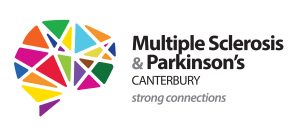An update on MS research by Dr Hamish Campbell
When asked what excites Dr Hamish Campbell about the future of multiple sclerosis (MS) research, his eyes light up. “Remyelination,” he explains. “That, to me, does seem a bit like magic.” This was a hot topic of conversation throughout his recent presentation for MS & Parkinson’s Canterbury keynote speaker series at BrainTree. Dr Campbell believes that in the future, patients will take “a couple” of medications – one to stop the immune attack and one to help repair the myelin. However, it is important to note that this is not going to be a silver bullet and completely reverse long-term disability, and he was nervous to commit to a specific timeframe. “But I think it’s going to have a big impact.”
If anyone will know, it is Dr Campbell. He boasts an impressive resume in the field of medical research. After graduating with a Bachelor of Science (Hons) in Genetics, and a PhD in cancer and viruses from the University of Otago, Dr Campbell taught medicine at the University of Sydney and worked as a scientist at the Children’s Medical Research Institute in Sydney. More recently, Dr Campbell took on the role of Deputy Head of Research at MS Australia, where he oversaw medical research into MS. While he has now stepped away from this position to focus on politics, he recalls a statement once said to him that “once you enter the MS field, you can never leave.” This appears to be true.
Dr Campbell was aware that “unveiling the mysteries of MS” in an hour session was an ambitious task, but began by explaining what MS is and the gradual increase of cases that have been observed recently. We were also shown a timeline of MS research and the advancements in medications. Interestingly – but to probably no surprise for the majority of the MS community – the lack of disease-modifying therapies (DMTs) available in Aotearoa New Zealand was a frustration for Dr Campbell. He explained that (at the time of writing) while Australia has fifteen subsidised DMTs, New Zealand has seven. “I think that here in New Zealand, we can actually do better,” he said.
So where to from here? Dr Campbell appreciates that there is a range of research going on, and that he has chosen three main areas of research based on his interests. These were cures, prevention, and better treatments and management of MS. He makes a point of explaining the importance of focusing on cures as opposed to a singular cure, as due to the snowflake nature of MS, it would be unrealistic to assume that one ‘cure’ will work for everyone. There are also challenges around using the word cure, as it potentially means something different to everyone. Some may expect it to stop progression, while others may expect it to reverse the damage already done. The latter is an area of focus for Dr Campbell. However, he explains that we can’t overlook the importance of prevention. “When you can stop people from developing MS in the first place… that is going to be very, very beneficial.” Dr Campbell suggests that access to more data, understanding what causes relapses, and focusing on risk factors (such as vitamin D and the Ebstein-Barr virus) will be the key to understanding this further.
Finally, it was time for a Q&A session, and there was a range of questions from the audience. Dr Campbell was asked about everything from the importance of an MS registry and the current IT system to discussions about the potential relation between oral health and MS, and why females are more susceptible to an MS diagnosis. Multiple questions were asked about those living with progressive forms of MS, as it is hard for them to not feel left behind during MS discussions and research. While Dr Campbell was unable to answer specific questions relating to personal situations, he was sympathetic to the frustrations and concerns that members of the community have around access to neurologists, the health system, and the quality of care.
Even though Dr Campbell started his presentation by admitting that scientists “…have a bit of a reputation as being as entertaining as goldfish” he needn’t have worried. It is clear that he has a passion for MS research, and is dedicated to improving the lives of people living with MS. Something we all love to see here at MS & Parkinson’s Canterbury.
If you’re interested in finding out more, you can watch the full keynote presentation from Dr Campbell here facebook or youtube
Make sure you keep up to date on our social media channels to find out about upcoming events.
